CNA514 Oncology: Factors Affecting Cancer Patient Quality of Life
VerifiedAdded on 2022/11/15
|16
|5735
|217
Report
AI Summary
This report, prepared for the CNA514 Oncology Nursing 3 course at the University of Tasmania, examines the multifaceted aspects of oncology nursing care, with a specific focus on improving the health-related quality of life for cancer patients, particularly those with terminal illnesses. It is divided into three objectives, the first of which explores the modulating factors of quality of life, highlighting the impact of emotional and practical support, symptom management, and communication. The second objective delves into the role of nurses in pain management, differentiating between nociceptive and neuropathic pain and emphasizing the importance of comprehensive patient assessment and individualized care plans. The third objective focuses on the application of emotional intelligence in nursing practice, emphasizing empathy and its role in managing patients' emotions and improving their overall well-being. The report includes a literature review, evidence of meeting the learning objectives, and a reflective review, providing a holistic understanding of oncology nursing practices and their impact on patient outcomes.
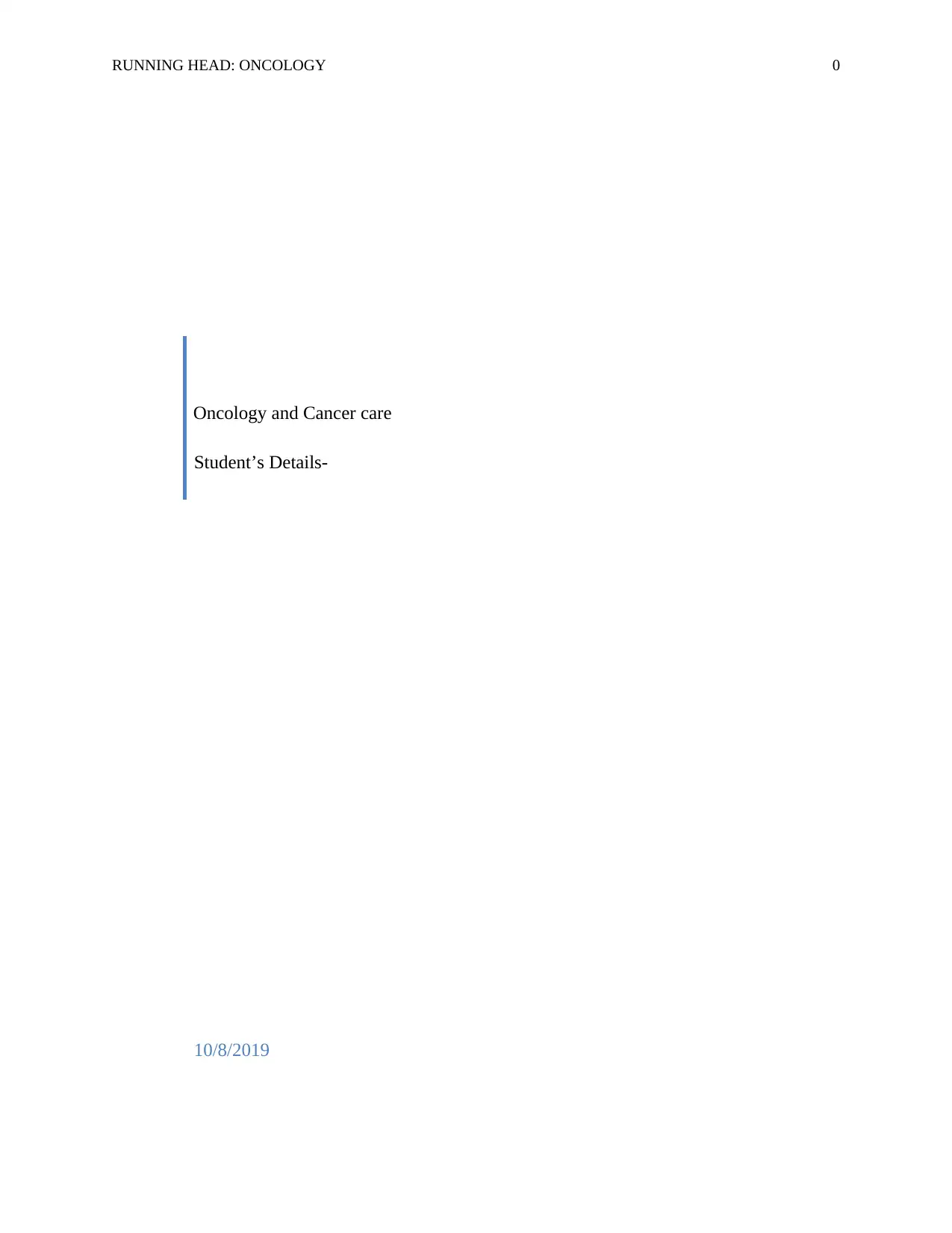
RUNNING HEAD: ONCOLOGY 0
Oncology and Cancer care
Student’s Details-
10/8/2019
Oncology and Cancer care
Student’s Details-
10/8/2019
Paraphrase This Document
Need a fresh take? Get an instant paraphrase of this document with our AI Paraphraser
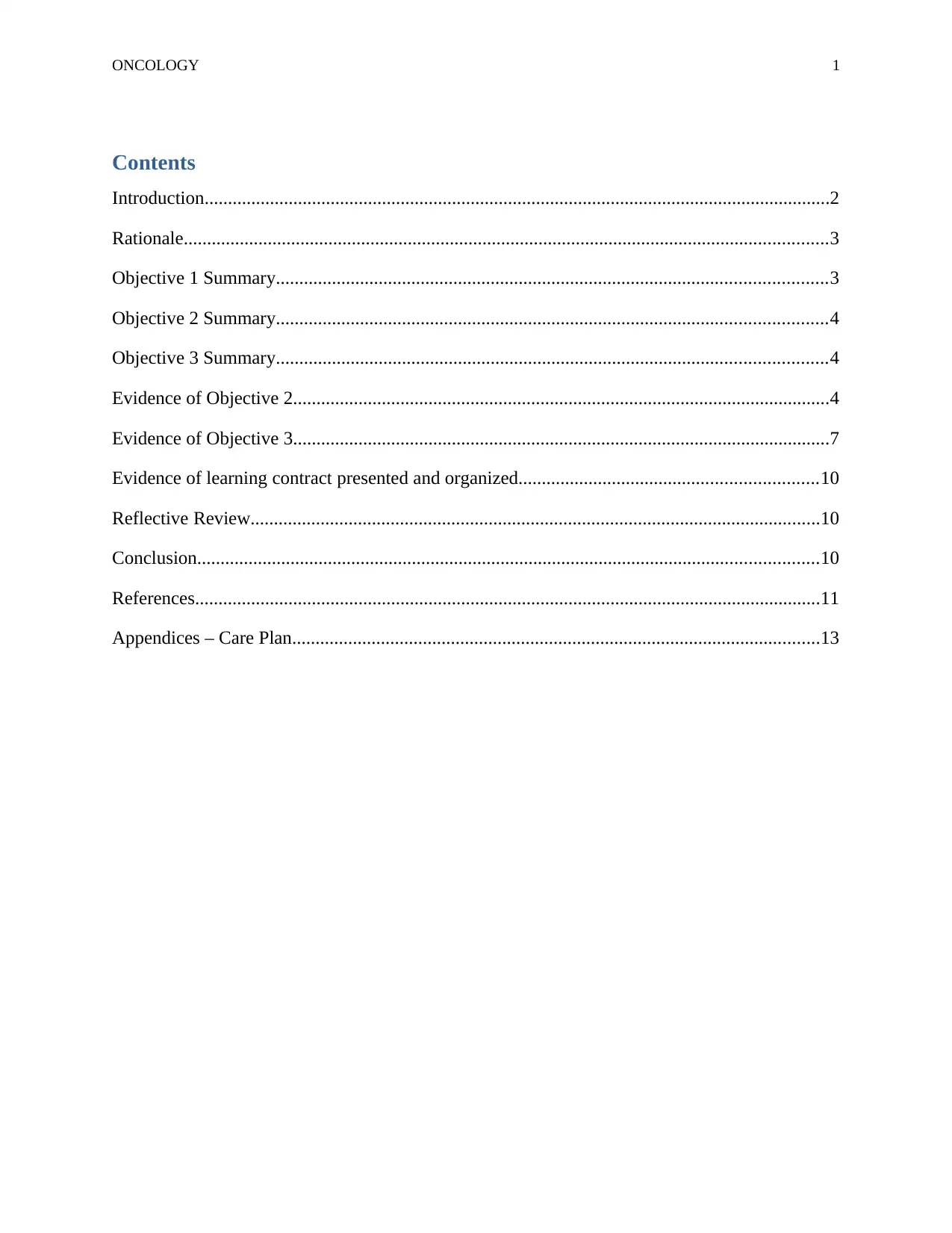
ONCOLOGY 1
Contents
Introduction......................................................................................................................................2
Rationale..........................................................................................................................................3
Objective 1 Summary......................................................................................................................3
Objective 2 Summary......................................................................................................................4
Objective 3 Summary......................................................................................................................4
Evidence of Objective 2...................................................................................................................4
Evidence of Objective 3...................................................................................................................7
Evidence of learning contract presented and organized................................................................10
Reflective Review..........................................................................................................................10
Conclusion.....................................................................................................................................10
References......................................................................................................................................11
Appendices – Care Plan.................................................................................................................13
Contents
Introduction......................................................................................................................................2
Rationale..........................................................................................................................................3
Objective 1 Summary......................................................................................................................3
Objective 2 Summary......................................................................................................................4
Objective 3 Summary......................................................................................................................4
Evidence of Objective 2...................................................................................................................4
Evidence of Objective 3...................................................................................................................7
Evidence of learning contract presented and organized................................................................10
Reflective Review..........................................................................................................................10
Conclusion.....................................................................................................................................10
References......................................................................................................................................11
Appendices – Care Plan.................................................................................................................13
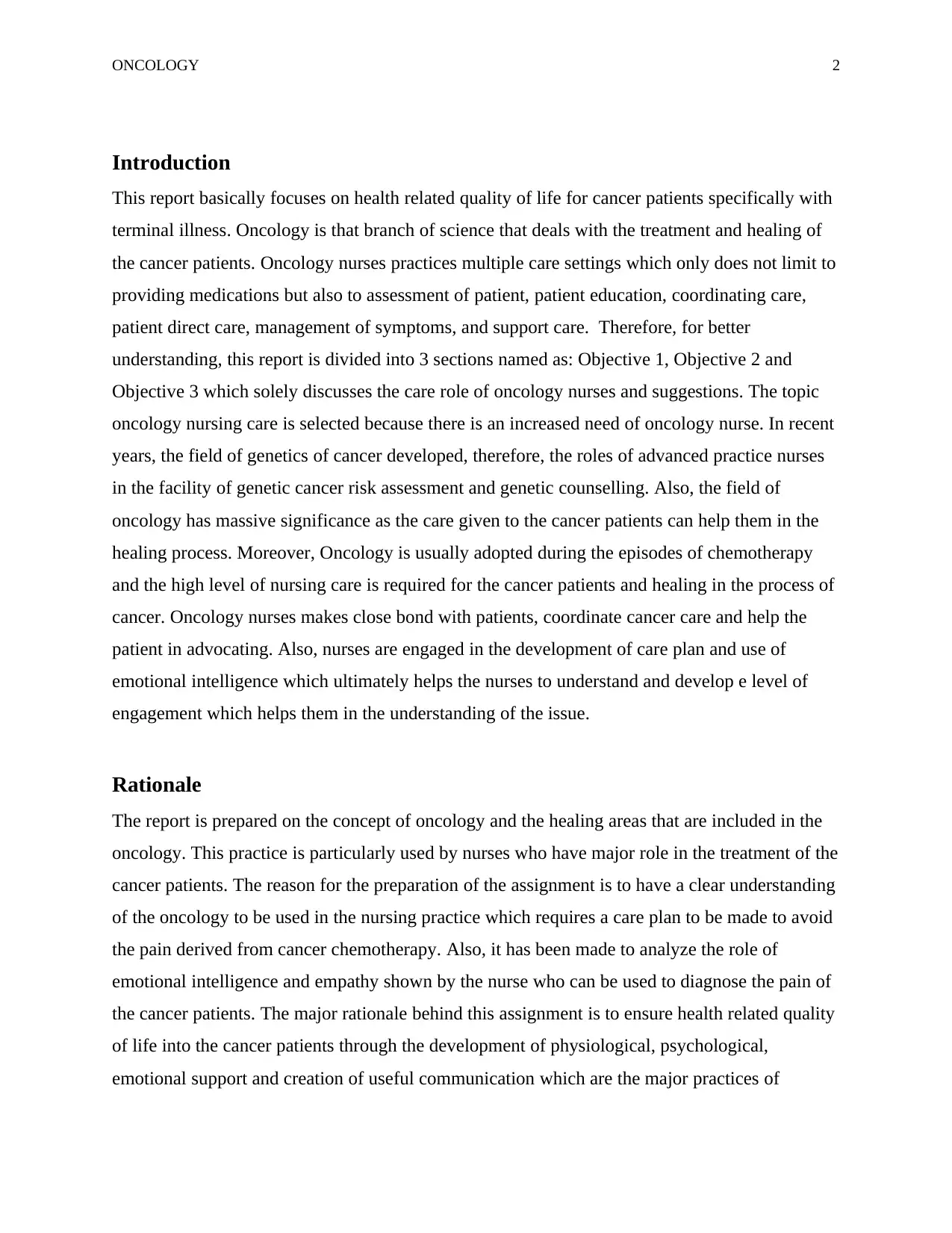
ONCOLOGY 2
Introduction
This report basically focuses on health related quality of life for cancer patients specifically with
terminal illness. Oncology is that branch of science that deals with the treatment and healing of
the cancer patients. Oncology nurses practices multiple care settings which only does not limit to
providing medications but also to assessment of patient, patient education, coordinating care,
patient direct care, management of symptoms, and support care. Therefore, for better
understanding, this report is divided into 3 sections named as: Objective 1, Objective 2 and
Objective 3 which solely discusses the care role of oncology nurses and suggestions. The topic
oncology nursing care is selected because there is an increased need of oncology nurse. In recent
years, the field of genetics of cancer developed, therefore, the roles of advanced practice nurses
in the facility of genetic cancer risk assessment and genetic counselling. Also, the field of
oncology has massive significance as the care given to the cancer patients can help them in the
healing process. Moreover, Oncology is usually adopted during the episodes of chemotherapy
and the high level of nursing care is required for the cancer patients and healing in the process of
cancer. Oncology nurses makes close bond with patients, coordinate cancer care and help the
patient in advocating. Also, nurses are engaged in the development of care plan and use of
emotional intelligence which ultimately helps the nurses to understand and develop e level of
engagement which helps them in the understanding of the issue.
Rationale
The report is prepared on the concept of oncology and the healing areas that are included in the
oncology. This practice is particularly used by nurses who have major role in the treatment of the
cancer patients. The reason for the preparation of the assignment is to have a clear understanding
of the oncology to be used in the nursing practice which requires a care plan to be made to avoid
the pain derived from cancer chemotherapy. Also, it has been made to analyze the role of
emotional intelligence and empathy shown by the nurse who can be used to diagnose the pain of
the cancer patients. The major rationale behind this assignment is to ensure health related quality
of life into the cancer patients through the development of physiological, psychological,
emotional support and creation of useful communication which are the major practices of
Introduction
This report basically focuses on health related quality of life for cancer patients specifically with
terminal illness. Oncology is that branch of science that deals with the treatment and healing of
the cancer patients. Oncology nurses practices multiple care settings which only does not limit to
providing medications but also to assessment of patient, patient education, coordinating care,
patient direct care, management of symptoms, and support care. Therefore, for better
understanding, this report is divided into 3 sections named as: Objective 1, Objective 2 and
Objective 3 which solely discusses the care role of oncology nurses and suggestions. The topic
oncology nursing care is selected because there is an increased need of oncology nurse. In recent
years, the field of genetics of cancer developed, therefore, the roles of advanced practice nurses
in the facility of genetic cancer risk assessment and genetic counselling. Also, the field of
oncology has massive significance as the care given to the cancer patients can help them in the
healing process. Moreover, Oncology is usually adopted during the episodes of chemotherapy
and the high level of nursing care is required for the cancer patients and healing in the process of
cancer. Oncology nurses makes close bond with patients, coordinate cancer care and help the
patient in advocating. Also, nurses are engaged in the development of care plan and use of
emotional intelligence which ultimately helps the nurses to understand and develop e level of
engagement which helps them in the understanding of the issue.
Rationale
The report is prepared on the concept of oncology and the healing areas that are included in the
oncology. This practice is particularly used by nurses who have major role in the treatment of the
cancer patients. The reason for the preparation of the assignment is to have a clear understanding
of the oncology to be used in the nursing practice which requires a care plan to be made to avoid
the pain derived from cancer chemotherapy. Also, it has been made to analyze the role of
emotional intelligence and empathy shown by the nurse who can be used to diagnose the pain of
the cancer patients. The major rationale behind this assignment is to ensure health related quality
of life into the cancer patients through the development of physiological, psychological,
emotional support and creation of useful communication which are the major practices of
⊘ This is a preview!⊘
Do you want full access?
Subscribe today to unlock all pages.

Trusted by 1+ million students worldwide
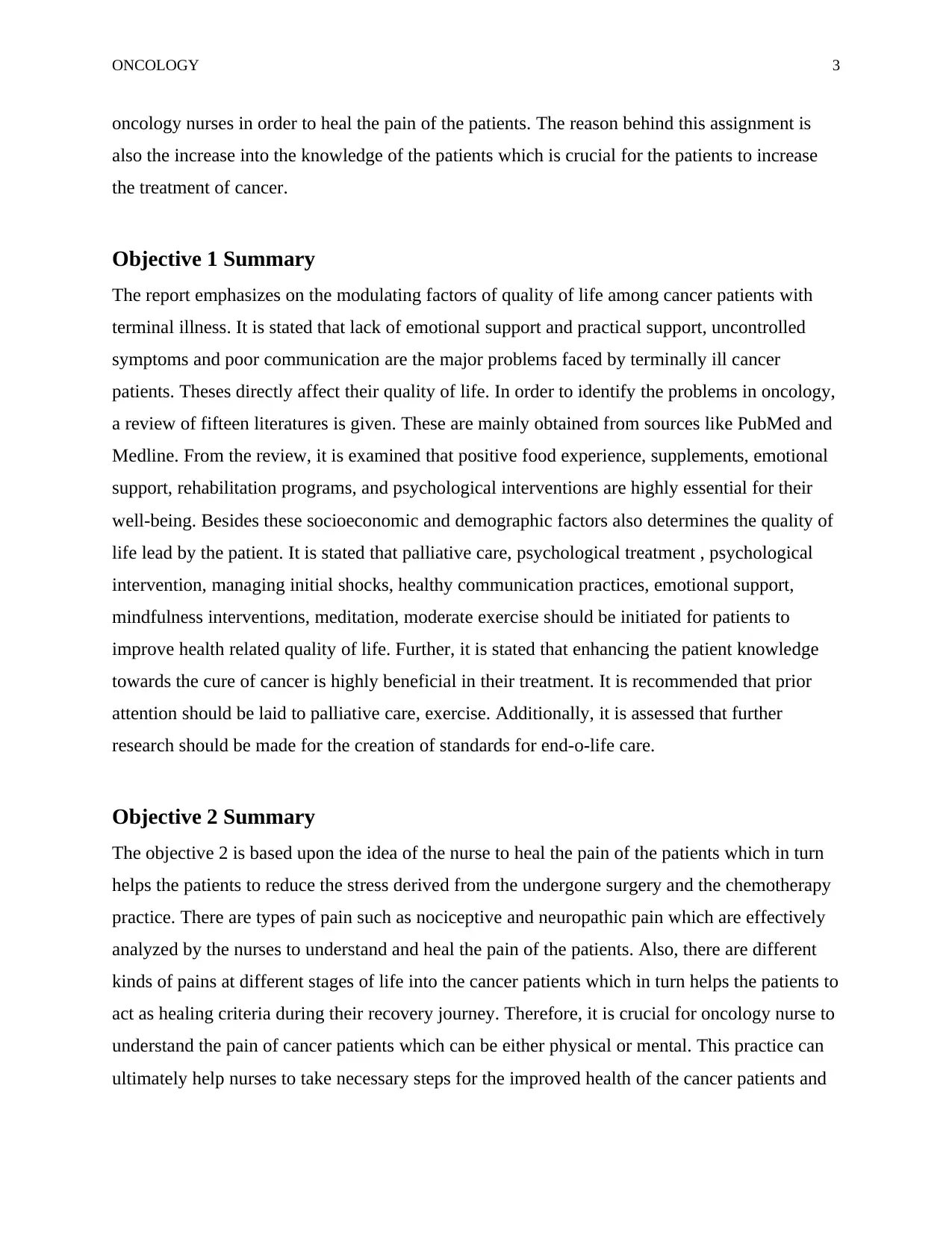
ONCOLOGY 3
oncology nurses in order to heal the pain of the patients. The reason behind this assignment is
also the increase into the knowledge of the patients which is crucial for the patients to increase
the treatment of cancer.
Objective 1 Summary
The report emphasizes on the modulating factors of quality of life among cancer patients with
terminal illness. It is stated that lack of emotional support and practical support, uncontrolled
symptoms and poor communication are the major problems faced by terminally ill cancer
patients. Theses directly affect their quality of life. In order to identify the problems in oncology,
a review of fifteen literatures is given. These are mainly obtained from sources like PubMed and
Medline. From the review, it is examined that positive food experience, supplements, emotional
support, rehabilitation programs, and psychological interventions are highly essential for their
well-being. Besides these socioeconomic and demographic factors also determines the quality of
life lead by the patient. It is stated that palliative care, psychological treatment , psychological
intervention, managing initial shocks, healthy communication practices, emotional support,
mindfulness interventions, meditation, moderate exercise should be initiated for patients to
improve health related quality of life. Further, it is stated that enhancing the patient knowledge
towards the cure of cancer is highly beneficial in their treatment. It is recommended that prior
attention should be laid to palliative care, exercise. Additionally, it is assessed that further
research should be made for the creation of standards for end-o-life care.
Objective 2 Summary
The objective 2 is based upon the idea of the nurse to heal the pain of the patients which in turn
helps the patients to reduce the stress derived from the undergone surgery and the chemotherapy
practice. There are types of pain such as nociceptive and neuropathic pain which are effectively
analyzed by the nurses to understand and heal the pain of the patients. Also, there are different
kinds of pains at different stages of life into the cancer patients which in turn helps the patients to
act as healing criteria during their recovery journey. Therefore, it is crucial for oncology nurse to
understand the pain of cancer patients which can be either physical or mental. This practice can
ultimately help nurses to take necessary steps for the improved health of the cancer patients and
oncology nurses in order to heal the pain of the patients. The reason behind this assignment is
also the increase into the knowledge of the patients which is crucial for the patients to increase
the treatment of cancer.
Objective 1 Summary
The report emphasizes on the modulating factors of quality of life among cancer patients with
terminal illness. It is stated that lack of emotional support and practical support, uncontrolled
symptoms and poor communication are the major problems faced by terminally ill cancer
patients. Theses directly affect their quality of life. In order to identify the problems in oncology,
a review of fifteen literatures is given. These are mainly obtained from sources like PubMed and
Medline. From the review, it is examined that positive food experience, supplements, emotional
support, rehabilitation programs, and psychological interventions are highly essential for their
well-being. Besides these socioeconomic and demographic factors also determines the quality of
life lead by the patient. It is stated that palliative care, psychological treatment , psychological
intervention, managing initial shocks, healthy communication practices, emotional support,
mindfulness interventions, meditation, moderate exercise should be initiated for patients to
improve health related quality of life. Further, it is stated that enhancing the patient knowledge
towards the cure of cancer is highly beneficial in their treatment. It is recommended that prior
attention should be laid to palliative care, exercise. Additionally, it is assessed that further
research should be made for the creation of standards for end-o-life care.
Objective 2 Summary
The objective 2 is based upon the idea of the nurse to heal the pain of the patients which in turn
helps the patients to reduce the stress derived from the undergone surgery and the chemotherapy
practice. There are types of pain such as nociceptive and neuropathic pain which are effectively
analyzed by the nurses to understand and heal the pain of the patients. Also, there are different
kinds of pains at different stages of life into the cancer patients which in turn helps the patients to
act as healing criteria during their recovery journey. Therefore, it is crucial for oncology nurse to
understand the pain of cancer patients which can be either physical or mental. This practice can
ultimately help nurses to take necessary steps for the improved health of the cancer patients and
Paraphrase This Document
Need a fresh take? Get an instant paraphrase of this document with our AI Paraphraser
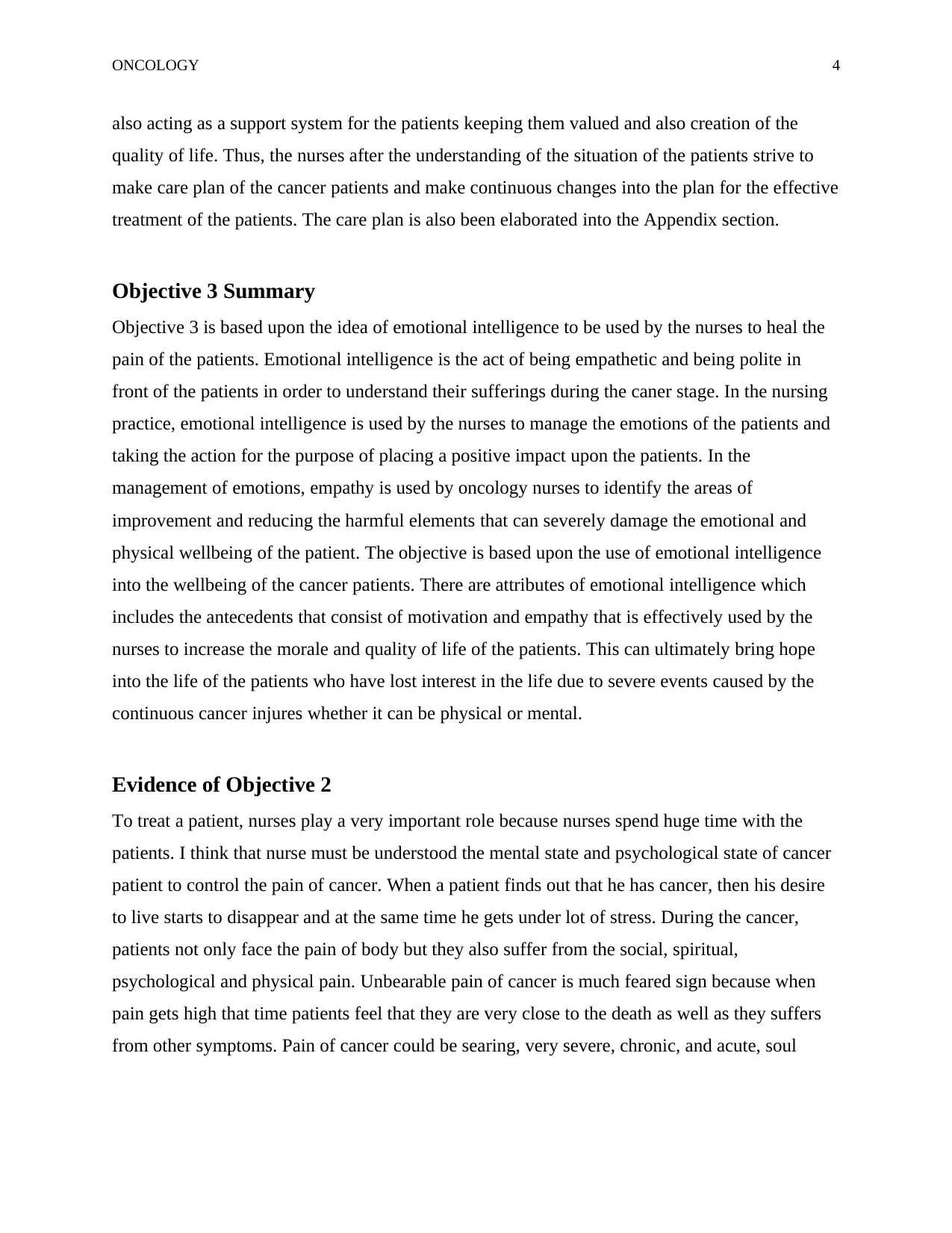
ONCOLOGY 4
also acting as a support system for the patients keeping them valued and also creation of the
quality of life. Thus, the nurses after the understanding of the situation of the patients strive to
make care plan of the cancer patients and make continuous changes into the plan for the effective
treatment of the patients. The care plan is also been elaborated into the Appendix section.
Objective 3 Summary
Objective 3 is based upon the idea of emotional intelligence to be used by the nurses to heal the
pain of the patients. Emotional intelligence is the act of being empathetic and being polite in
front of the patients in order to understand their sufferings during the caner stage. In the nursing
practice, emotional intelligence is used by the nurses to manage the emotions of the patients and
taking the action for the purpose of placing a positive impact upon the patients. In the
management of emotions, empathy is used by oncology nurses to identify the areas of
improvement and reducing the harmful elements that can severely damage the emotional and
physical wellbeing of the patient. The objective is based upon the use of emotional intelligence
into the wellbeing of the cancer patients. There are attributes of emotional intelligence which
includes the antecedents that consist of motivation and empathy that is effectively used by the
nurses to increase the morale and quality of life of the patients. This can ultimately bring hope
into the life of the patients who have lost interest in the life due to severe events caused by the
continuous cancer injures whether it can be physical or mental.
Evidence of Objective 2
To treat a patient, nurses play a very important role because nurses spend huge time with the
patients. I think that nurse must be understood the mental state and psychological state of cancer
patient to control the pain of cancer. When a patient finds out that he has cancer, then his desire
to live starts to disappear and at the same time he gets under lot of stress. During the cancer,
patients not only face the pain of body but they also suffer from the social, spiritual,
psychological and physical pain. Unbearable pain of cancer is much feared sign because when
pain gets high that time patients feel that they are very close to the death as well as they suffers
from other symptoms. Pain of cancer could be searing, very severe, chronic, and acute, soul
also acting as a support system for the patients keeping them valued and also creation of the
quality of life. Thus, the nurses after the understanding of the situation of the patients strive to
make care plan of the cancer patients and make continuous changes into the plan for the effective
treatment of the patients. The care plan is also been elaborated into the Appendix section.
Objective 3 Summary
Objective 3 is based upon the idea of emotional intelligence to be used by the nurses to heal the
pain of the patients. Emotional intelligence is the act of being empathetic and being polite in
front of the patients in order to understand their sufferings during the caner stage. In the nursing
practice, emotional intelligence is used by the nurses to manage the emotions of the patients and
taking the action for the purpose of placing a positive impact upon the patients. In the
management of emotions, empathy is used by oncology nurses to identify the areas of
improvement and reducing the harmful elements that can severely damage the emotional and
physical wellbeing of the patient. The objective is based upon the use of emotional intelligence
into the wellbeing of the cancer patients. There are attributes of emotional intelligence which
includes the antecedents that consist of motivation and empathy that is effectively used by the
nurses to increase the morale and quality of life of the patients. This can ultimately bring hope
into the life of the patients who have lost interest in the life due to severe events caused by the
continuous cancer injures whether it can be physical or mental.
Evidence of Objective 2
To treat a patient, nurses play a very important role because nurses spend huge time with the
patients. I think that nurse must be understood the mental state and psychological state of cancer
patient to control the pain of cancer. When a patient finds out that he has cancer, then his desire
to live starts to disappear and at the same time he gets under lot of stress. During the cancer,
patients not only face the pain of body but they also suffer from the social, spiritual,
psychological and physical pain. Unbearable pain of cancer is much feared sign because when
pain gets high that time patients feel that they are very close to the death as well as they suffers
from other symptoms. Pain of cancer could be searing, very severe, chronic, and acute, soul
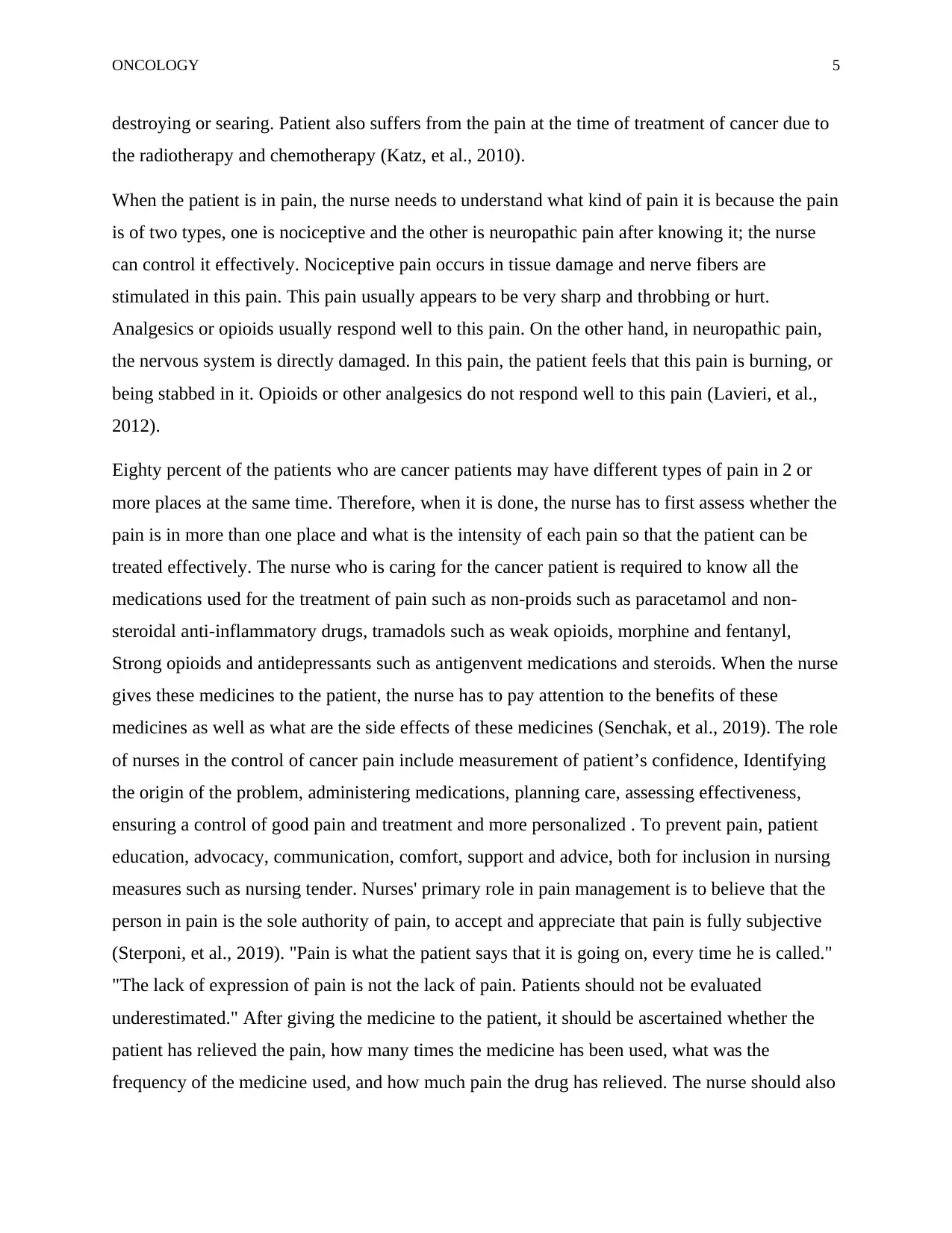
ONCOLOGY 5
destroying or searing. Patient also suffers from the pain at the time of treatment of cancer due to
the radiotherapy and chemotherapy (Katz, et al., 2010).
When the patient is in pain, the nurse needs to understand what kind of pain it is because the pain
is of two types, one is nociceptive and the other is neuropathic pain after knowing it; the nurse
can control it effectively. Nociceptive pain occurs in tissue damage and nerve fibers are
stimulated in this pain. This pain usually appears to be very sharp and throbbing or hurt.
Analgesics or opioids usually respond well to this pain. On the other hand, in neuropathic pain,
the nervous system is directly damaged. In this pain, the patient feels that this pain is burning, or
being stabbed in it. Opioids or other analgesics do not respond well to this pain (Lavieri, et al.,
2012).
Eighty percent of the patients who are cancer patients may have different types of pain in 2 or
more places at the same time. Therefore, when it is done, the nurse has to first assess whether the
pain is in more than one place and what is the intensity of each pain so that the patient can be
treated effectively. The nurse who is caring for the cancer patient is required to know all the
medications used for the treatment of pain such as non-proids such as paracetamol and non-
steroidal anti-inflammatory drugs, tramadols such as weak opioids, morphine and fentanyl,
Strong opioids and antidepressants such as antigenvent medications and steroids. When the nurse
gives these medicines to the patient, the nurse has to pay attention to the benefits of these
medicines as well as what are the side effects of these medicines (Senchak, et al., 2019). The role
of nurses in the control of cancer pain include measurement of patient’s confidence, Identifying
the origin of the problem, administering medications, planning care, assessing effectiveness,
ensuring a control of good pain and treatment and more personalized . To prevent pain, patient
education, advocacy, communication, comfort, support and advice, both for inclusion in nursing
measures such as nursing tender. Nurses' primary role in pain management is to believe that the
person in pain is the sole authority of pain, to accept and appreciate that pain is fully subjective
(Sterponi, et al., 2019). "Pain is what the patient says that it is going on, every time he is called."
"The lack of expression of pain is not the lack of pain. Patients should not be evaluated
underestimated." After giving the medicine to the patient, it should be ascertained whether the
patient has relieved the pain, how many times the medicine has been used, what was the
frequency of the medicine used, and how much pain the drug has relieved. The nurse should also
destroying or searing. Patient also suffers from the pain at the time of treatment of cancer due to
the radiotherapy and chemotherapy (Katz, et al., 2010).
When the patient is in pain, the nurse needs to understand what kind of pain it is because the pain
is of two types, one is nociceptive and the other is neuropathic pain after knowing it; the nurse
can control it effectively. Nociceptive pain occurs in tissue damage and nerve fibers are
stimulated in this pain. This pain usually appears to be very sharp and throbbing or hurt.
Analgesics or opioids usually respond well to this pain. On the other hand, in neuropathic pain,
the nervous system is directly damaged. In this pain, the patient feels that this pain is burning, or
being stabbed in it. Opioids or other analgesics do not respond well to this pain (Lavieri, et al.,
2012).
Eighty percent of the patients who are cancer patients may have different types of pain in 2 or
more places at the same time. Therefore, when it is done, the nurse has to first assess whether the
pain is in more than one place and what is the intensity of each pain so that the patient can be
treated effectively. The nurse who is caring for the cancer patient is required to know all the
medications used for the treatment of pain such as non-proids such as paracetamol and non-
steroidal anti-inflammatory drugs, tramadols such as weak opioids, morphine and fentanyl,
Strong opioids and antidepressants such as antigenvent medications and steroids. When the nurse
gives these medicines to the patient, the nurse has to pay attention to the benefits of these
medicines as well as what are the side effects of these medicines (Senchak, et al., 2019). The role
of nurses in the control of cancer pain include measurement of patient’s confidence, Identifying
the origin of the problem, administering medications, planning care, assessing effectiveness,
ensuring a control of good pain and treatment and more personalized . To prevent pain, patient
education, advocacy, communication, comfort, support and advice, both for inclusion in nursing
measures such as nursing tender. Nurses' primary role in pain management is to believe that the
person in pain is the sole authority of pain, to accept and appreciate that pain is fully subjective
(Sterponi, et al., 2019). "Pain is what the patient says that it is going on, every time he is called."
"The lack of expression of pain is not the lack of pain. Patients should not be evaluated
underestimated." After giving the medicine to the patient, it should be ascertained whether the
patient has relieved the pain, how many times the medicine has been used, what was the
frequency of the medicine used, and how much pain the drug has relieved. The nurse should also
⊘ This is a preview!⊘
Do you want full access?
Subscribe today to unlock all pages.

Trusted by 1+ million students worldwide
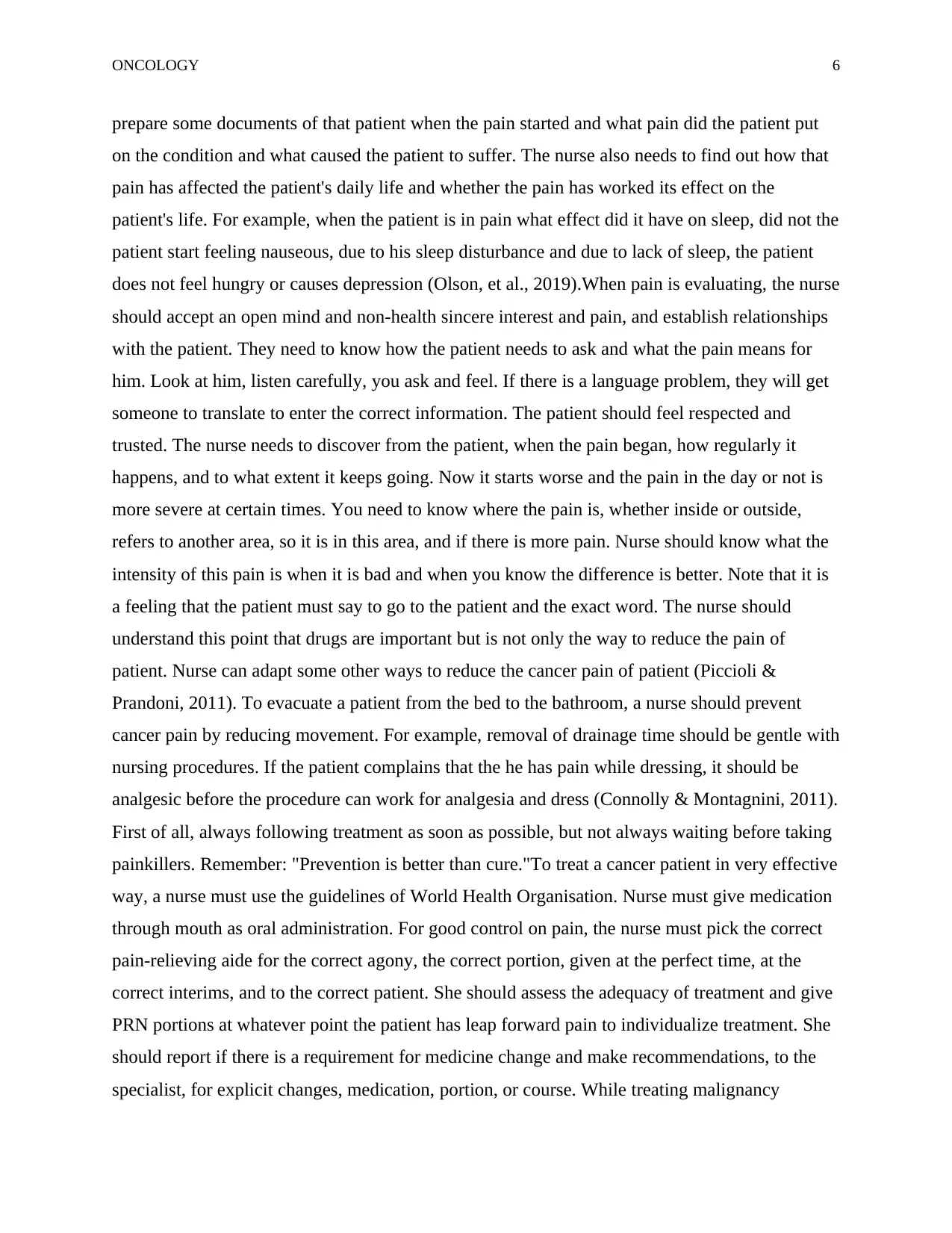
ONCOLOGY 6
prepare some documents of that patient when the pain started and what pain did the patient put
on the condition and what caused the patient to suffer. The nurse also needs to find out how that
pain has affected the patient's daily life and whether the pain has worked its effect on the
patient's life. For example, when the patient is in pain what effect did it have on sleep, did not the
patient start feeling nauseous, due to his sleep disturbance and due to lack of sleep, the patient
does not feel hungry or causes depression (Olson, et al., 2019).When pain is evaluating, the nurse
should accept an open mind and non-health sincere interest and pain, and establish relationships
with the patient. They need to know how the patient needs to ask and what the pain means for
him. Look at him, listen carefully, you ask and feel. If there is a language problem, they will get
someone to translate to enter the correct information. The patient should feel respected and
trusted. The nurse needs to discover from the patient, when the pain began, how regularly it
happens, and to what extent it keeps going. Now it starts worse and the pain in the day or not is
more severe at certain times. You need to know where the pain is, whether inside or outside,
refers to another area, so it is in this area, and if there is more pain. Nurse should know what the
intensity of this pain is when it is bad and when you know the difference is better. Note that it is
a feeling that the patient must say to go to the patient and the exact word. The nurse should
understand this point that drugs are important but is not only the way to reduce the pain of
patient. Nurse can adapt some other ways to reduce the cancer pain of patient (Piccioli &
Prandoni, 2011). To evacuate a patient from the bed to the bathroom, a nurse should prevent
cancer pain by reducing movement. For example, removal of drainage time should be gentle with
nursing procedures. If the patient complains that the he has pain while dressing, it should be
analgesic before the procedure can work for analgesia and dress (Connolly & Montagnini, 2011).
First of all, always following treatment as soon as possible, but not always waiting before taking
painkillers. Remember: "Prevention is better than cure."To treat a cancer patient in very effective
way, a nurse must use the guidelines of World Health Organisation. Nurse must give medication
through mouth as oral administration. For good control on pain, the nurse must pick the correct
pain-relieving aide for the correct agony, the correct portion, given at the perfect time, at the
correct interims, and to the correct patient. She should assess the adequacy of treatment and give
PRN portions at whatever point the patient has leap forward pain to individualize treatment. She
should report if there is a requirement for medicine change and make recommendations, to the
specialist, for explicit changes, medication, portion, or course. While treating malignancy
prepare some documents of that patient when the pain started and what pain did the patient put
on the condition and what caused the patient to suffer. The nurse also needs to find out how that
pain has affected the patient's daily life and whether the pain has worked its effect on the
patient's life. For example, when the patient is in pain what effect did it have on sleep, did not the
patient start feeling nauseous, due to his sleep disturbance and due to lack of sleep, the patient
does not feel hungry or causes depression (Olson, et al., 2019).When pain is evaluating, the nurse
should accept an open mind and non-health sincere interest and pain, and establish relationships
with the patient. They need to know how the patient needs to ask and what the pain means for
him. Look at him, listen carefully, you ask and feel. If there is a language problem, they will get
someone to translate to enter the correct information. The patient should feel respected and
trusted. The nurse needs to discover from the patient, when the pain began, how regularly it
happens, and to what extent it keeps going. Now it starts worse and the pain in the day or not is
more severe at certain times. You need to know where the pain is, whether inside or outside,
refers to another area, so it is in this area, and if there is more pain. Nurse should know what the
intensity of this pain is when it is bad and when you know the difference is better. Note that it is
a feeling that the patient must say to go to the patient and the exact word. The nurse should
understand this point that drugs are important but is not only the way to reduce the pain of
patient. Nurse can adapt some other ways to reduce the cancer pain of patient (Piccioli &
Prandoni, 2011). To evacuate a patient from the bed to the bathroom, a nurse should prevent
cancer pain by reducing movement. For example, removal of drainage time should be gentle with
nursing procedures. If the patient complains that the he has pain while dressing, it should be
analgesic before the procedure can work for analgesia and dress (Connolly & Montagnini, 2011).
First of all, always following treatment as soon as possible, but not always waiting before taking
painkillers. Remember: "Prevention is better than cure."To treat a cancer patient in very effective
way, a nurse must use the guidelines of World Health Organisation. Nurse must give medication
through mouth as oral administration. For good control on pain, the nurse must pick the correct
pain-relieving aide for the correct agony, the correct portion, given at the perfect time, at the
correct interims, and to the correct patient. She should assess the adequacy of treatment and give
PRN portions at whatever point the patient has leap forward pain to individualize treatment. She
should report if there is a requirement for medicine change and make recommendations, to the
specialist, for explicit changes, medication, portion, or course. While treating malignancy
Paraphrase This Document
Need a fresh take? Get an instant paraphrase of this document with our AI Paraphraser
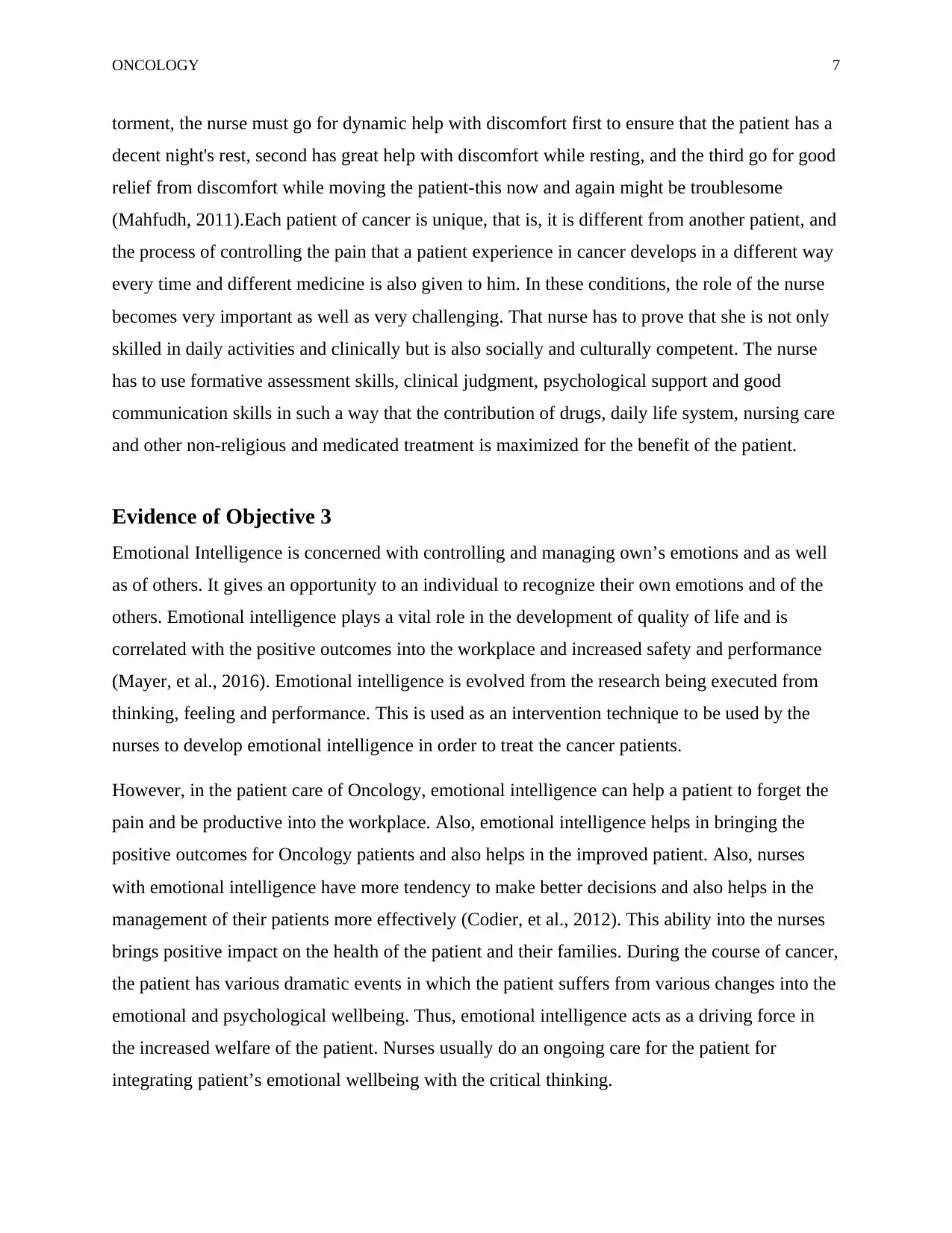
ONCOLOGY 7
torment, the nurse must go for dynamic help with discomfort first to ensure that the patient has a
decent night's rest, second has great help with discomfort while resting, and the third go for good
relief from discomfort while moving the patient-this now and again might be troublesome
(Mahfudh, 2011).Each patient of cancer is unique, that is, it is different from another patient, and
the process of controlling the pain that a patient experience in cancer develops in a different way
every time and different medicine is also given to him. In these conditions, the role of the nurse
becomes very important as well as very challenging. That nurse has to prove that she is not only
skilled in daily activities and clinically but is also socially and culturally competent. The nurse
has to use formative assessment skills, clinical judgment, psychological support and good
communication skills in such a way that the contribution of drugs, daily life system, nursing care
and other non-religious and medicated treatment is maximized for the benefit of the patient.
Evidence of Objective 3
Emotional Intelligence is concerned with controlling and managing own’s emotions and as well
as of others. It gives an opportunity to an individual to recognize their own emotions and of the
others. Emotional intelligence plays a vital role in the development of quality of life and is
correlated with the positive outcomes into the workplace and increased safety and performance
(Mayer, et al., 2016). Emotional intelligence is evolved from the research being executed from
thinking, feeling and performance. This is used as an intervention technique to be used by the
nurses to develop emotional intelligence in order to treat the cancer patients.
However, in the patient care of Oncology, emotional intelligence can help a patient to forget the
pain and be productive into the workplace. Also, emotional intelligence helps in bringing the
positive outcomes for Oncology patients and also helps in the improved patient. Also, nurses
with emotional intelligence have more tendency to make better decisions and also helps in the
management of their patients more effectively (Codier, et al., 2012). This ability into the nurses
brings positive impact on the health of the patient and their families. During the course of cancer,
the patient has various dramatic events in which the patient suffers from various changes into the
emotional and psychological wellbeing. Thus, emotional intelligence acts as a driving force in
the increased welfare of the patient. Nurses usually do an ongoing care for the patient for
integrating patient’s emotional wellbeing with the critical thinking.
torment, the nurse must go for dynamic help with discomfort first to ensure that the patient has a
decent night's rest, second has great help with discomfort while resting, and the third go for good
relief from discomfort while moving the patient-this now and again might be troublesome
(Mahfudh, 2011).Each patient of cancer is unique, that is, it is different from another patient, and
the process of controlling the pain that a patient experience in cancer develops in a different way
every time and different medicine is also given to him. In these conditions, the role of the nurse
becomes very important as well as very challenging. That nurse has to prove that she is not only
skilled in daily activities and clinically but is also socially and culturally competent. The nurse
has to use formative assessment skills, clinical judgment, psychological support and good
communication skills in such a way that the contribution of drugs, daily life system, nursing care
and other non-religious and medicated treatment is maximized for the benefit of the patient.
Evidence of Objective 3
Emotional Intelligence is concerned with controlling and managing own’s emotions and as well
as of others. It gives an opportunity to an individual to recognize their own emotions and of the
others. Emotional intelligence plays a vital role in the development of quality of life and is
correlated with the positive outcomes into the workplace and increased safety and performance
(Mayer, et al., 2016). Emotional intelligence is evolved from the research being executed from
thinking, feeling and performance. This is used as an intervention technique to be used by the
nurses to develop emotional intelligence in order to treat the cancer patients.
However, in the patient care of Oncology, emotional intelligence can help a patient to forget the
pain and be productive into the workplace. Also, emotional intelligence helps in bringing the
positive outcomes for Oncology patients and also helps in the improved patient. Also, nurses
with emotional intelligence have more tendency to make better decisions and also helps in the
management of their patients more effectively (Codier, et al., 2012). This ability into the nurses
brings positive impact on the health of the patient and their families. During the course of cancer,
the patient has various dramatic events in which the patient suffers from various changes into the
emotional and psychological wellbeing. Thus, emotional intelligence acts as a driving force in
the increased welfare of the patient. Nurses usually do an ongoing care for the patient for
integrating patient’s emotional wellbeing with the critical thinking.
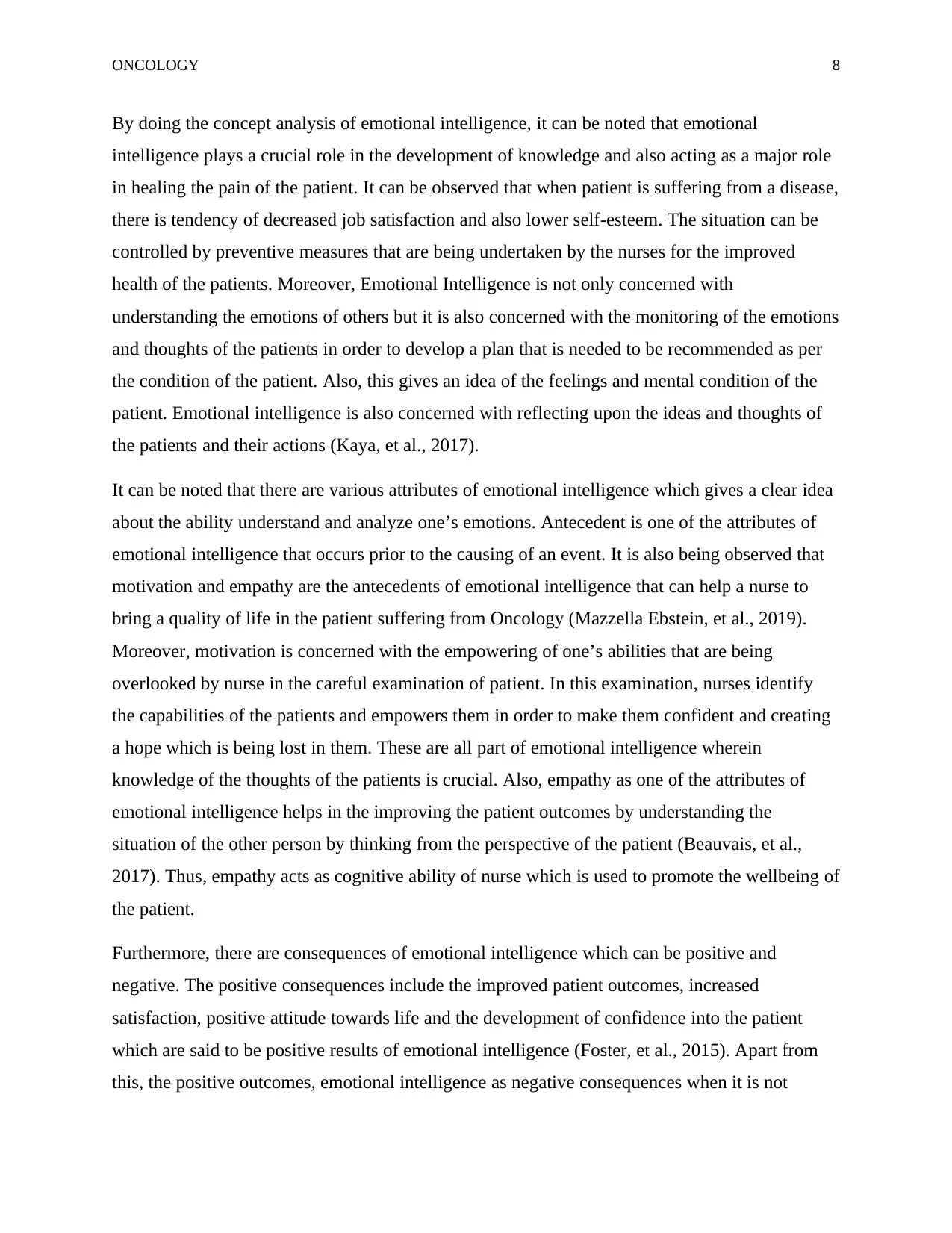
ONCOLOGY 8
By doing the concept analysis of emotional intelligence, it can be noted that emotional
intelligence plays a crucial role in the development of knowledge and also acting as a major role
in healing the pain of the patient. It can be observed that when patient is suffering from a disease,
there is tendency of decreased job satisfaction and also lower self-esteem. The situation can be
controlled by preventive measures that are being undertaken by the nurses for the improved
health of the patients. Moreover, Emotional Intelligence is not only concerned with
understanding the emotions of others but it is also concerned with the monitoring of the emotions
and thoughts of the patients in order to develop a plan that is needed to be recommended as per
the condition of the patient. Also, this gives an idea of the feelings and mental condition of the
patient. Emotional intelligence is also concerned with reflecting upon the ideas and thoughts of
the patients and their actions (Kaya, et al., 2017).
It can be noted that there are various attributes of emotional intelligence which gives a clear idea
about the ability understand and analyze one’s emotions. Antecedent is one of the attributes of
emotional intelligence that occurs prior to the causing of an event. It is also being observed that
motivation and empathy are the antecedents of emotional intelligence that can help a nurse to
bring a quality of life in the patient suffering from Oncology (Mazzella Ebstein, et al., 2019).
Moreover, motivation is concerned with the empowering of one’s abilities that are being
overlooked by nurse in the careful examination of patient. In this examination, nurses identify
the capabilities of the patients and empowers them in order to make them confident and creating
a hope which is being lost in them. These are all part of emotional intelligence wherein
knowledge of the thoughts of the patients is crucial. Also, empathy as one of the attributes of
emotional intelligence helps in the improving the patient outcomes by understanding the
situation of the other person by thinking from the perspective of the patient (Beauvais, et al.,
2017). Thus, empathy acts as cognitive ability of nurse which is used to promote the wellbeing of
the patient.
Furthermore, there are consequences of emotional intelligence which can be positive and
negative. The positive consequences include the improved patient outcomes, increased
satisfaction, positive attitude towards life and the development of confidence into the patient
which are said to be positive results of emotional intelligence (Foster, et al., 2015). Apart from
this, the positive outcomes, emotional intelligence as negative consequences when it is not
By doing the concept analysis of emotional intelligence, it can be noted that emotional
intelligence plays a crucial role in the development of knowledge and also acting as a major role
in healing the pain of the patient. It can be observed that when patient is suffering from a disease,
there is tendency of decreased job satisfaction and also lower self-esteem. The situation can be
controlled by preventive measures that are being undertaken by the nurses for the improved
health of the patients. Moreover, Emotional Intelligence is not only concerned with
understanding the emotions of others but it is also concerned with the monitoring of the emotions
and thoughts of the patients in order to develop a plan that is needed to be recommended as per
the condition of the patient. Also, this gives an idea of the feelings and mental condition of the
patient. Emotional intelligence is also concerned with reflecting upon the ideas and thoughts of
the patients and their actions (Kaya, et al., 2017).
It can be noted that there are various attributes of emotional intelligence which gives a clear idea
about the ability understand and analyze one’s emotions. Antecedent is one of the attributes of
emotional intelligence that occurs prior to the causing of an event. It is also being observed that
motivation and empathy are the antecedents of emotional intelligence that can help a nurse to
bring a quality of life in the patient suffering from Oncology (Mazzella Ebstein, et al., 2019).
Moreover, motivation is concerned with the empowering of one’s abilities that are being
overlooked by nurse in the careful examination of patient. In this examination, nurses identify
the capabilities of the patients and empowers them in order to make them confident and creating
a hope which is being lost in them. These are all part of emotional intelligence wherein
knowledge of the thoughts of the patients is crucial. Also, empathy as one of the attributes of
emotional intelligence helps in the improving the patient outcomes by understanding the
situation of the other person by thinking from the perspective of the patient (Beauvais, et al.,
2017). Thus, empathy acts as cognitive ability of nurse which is used to promote the wellbeing of
the patient.
Furthermore, there are consequences of emotional intelligence which can be positive and
negative. The positive consequences include the improved patient outcomes, increased
satisfaction, positive attitude towards life and the development of confidence into the patient
which are said to be positive results of emotional intelligence (Foster, et al., 2015). Apart from
this, the positive outcomes, emotional intelligence as negative consequences when it is not
⊘ This is a preview!⊘
Do you want full access?
Subscribe today to unlock all pages.

Trusted by 1+ million students worldwide
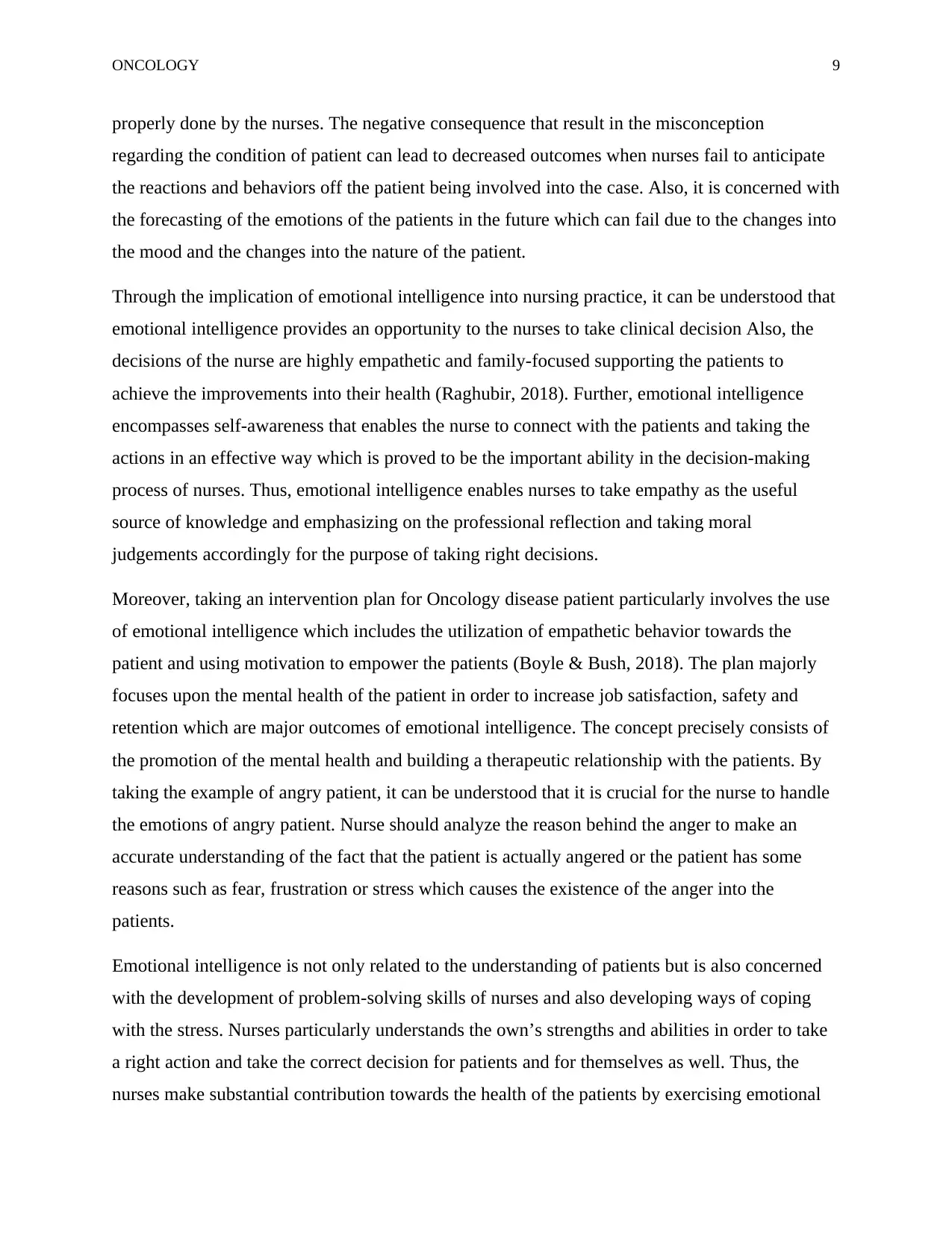
ONCOLOGY 9
properly done by the nurses. The negative consequence that result in the misconception
regarding the condition of patient can lead to decreased outcomes when nurses fail to anticipate
the reactions and behaviors off the patient being involved into the case. Also, it is concerned with
the forecasting of the emotions of the patients in the future which can fail due to the changes into
the mood and the changes into the nature of the patient.
Through the implication of emotional intelligence into nursing practice, it can be understood that
emotional intelligence provides an opportunity to the nurses to take clinical decision Also, the
decisions of the nurse are highly empathetic and family-focused supporting the patients to
achieve the improvements into their health (Raghubir, 2018). Further, emotional intelligence
encompasses self-awareness that enables the nurse to connect with the patients and taking the
actions in an effective way which is proved to be the important ability in the decision-making
process of nurses. Thus, emotional intelligence enables nurses to take empathy as the useful
source of knowledge and emphasizing on the professional reflection and taking moral
judgements accordingly for the purpose of taking right decisions.
Moreover, taking an intervention plan for Oncology disease patient particularly involves the use
of emotional intelligence which includes the utilization of empathetic behavior towards the
patient and using motivation to empower the patients (Boyle & Bush, 2018). The plan majorly
focuses upon the mental health of the patient in order to increase job satisfaction, safety and
retention which are major outcomes of emotional intelligence. The concept precisely consists of
the promotion of the mental health and building a therapeutic relationship with the patients. By
taking the example of angry patient, it can be understood that it is crucial for the nurse to handle
the emotions of angry patient. Nurse should analyze the reason behind the anger to make an
accurate understanding of the fact that the patient is actually angered or the patient has some
reasons such as fear, frustration or stress which causes the existence of the anger into the
patients.
Emotional intelligence is not only related to the understanding of patients but is also concerned
with the development of problem-solving skills of nurses and also developing ways of coping
with the stress. Nurses particularly understands the own’s strengths and abilities in order to take
a right action and take the correct decision for patients and for themselves as well. Thus, the
nurses make substantial contribution towards the health of the patients by exercising emotional
properly done by the nurses. The negative consequence that result in the misconception
regarding the condition of patient can lead to decreased outcomes when nurses fail to anticipate
the reactions and behaviors off the patient being involved into the case. Also, it is concerned with
the forecasting of the emotions of the patients in the future which can fail due to the changes into
the mood and the changes into the nature of the patient.
Through the implication of emotional intelligence into nursing practice, it can be understood that
emotional intelligence provides an opportunity to the nurses to take clinical decision Also, the
decisions of the nurse are highly empathetic and family-focused supporting the patients to
achieve the improvements into their health (Raghubir, 2018). Further, emotional intelligence
encompasses self-awareness that enables the nurse to connect with the patients and taking the
actions in an effective way which is proved to be the important ability in the decision-making
process of nurses. Thus, emotional intelligence enables nurses to take empathy as the useful
source of knowledge and emphasizing on the professional reflection and taking moral
judgements accordingly for the purpose of taking right decisions.
Moreover, taking an intervention plan for Oncology disease patient particularly involves the use
of emotional intelligence which includes the utilization of empathetic behavior towards the
patient and using motivation to empower the patients (Boyle & Bush, 2018). The plan majorly
focuses upon the mental health of the patient in order to increase job satisfaction, safety and
retention which are major outcomes of emotional intelligence. The concept precisely consists of
the promotion of the mental health and building a therapeutic relationship with the patients. By
taking the example of angry patient, it can be understood that it is crucial for the nurse to handle
the emotions of angry patient. Nurse should analyze the reason behind the anger to make an
accurate understanding of the fact that the patient is actually angered or the patient has some
reasons such as fear, frustration or stress which causes the existence of the anger into the
patients.
Emotional intelligence is not only related to the understanding of patients but is also concerned
with the development of problem-solving skills of nurses and also developing ways of coping
with the stress. Nurses particularly understands the own’s strengths and abilities in order to take
a right action and take the correct decision for patients and for themselves as well. Thus, the
nurses make substantial contribution towards the health of the patients by exercising emotional
Paraphrase This Document
Need a fresh take? Get an instant paraphrase of this document with our AI Paraphraser
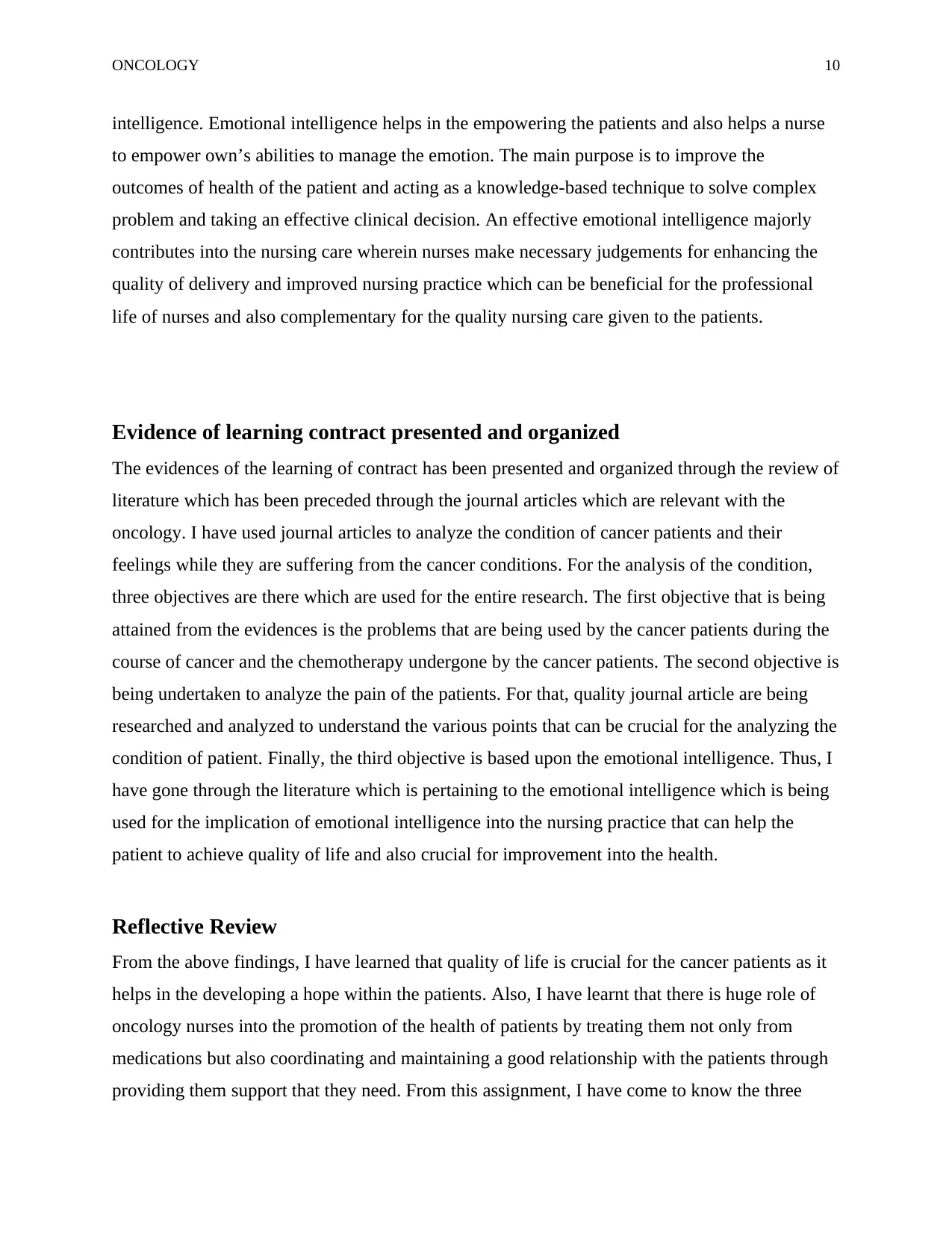
ONCOLOGY 10
intelligence. Emotional intelligence helps in the empowering the patients and also helps a nurse
to empower own’s abilities to manage the emotion. The main purpose is to improve the
outcomes of health of the patient and acting as a knowledge-based technique to solve complex
problem and taking an effective clinical decision. An effective emotional intelligence majorly
contributes into the nursing care wherein nurses make necessary judgements for enhancing the
quality of delivery and improved nursing practice which can be beneficial for the professional
life of nurses and also complementary for the quality nursing care given to the patients.
Evidence of learning contract presented and organized
The evidences of the learning of contract has been presented and organized through the review of
literature which has been preceded through the journal articles which are relevant with the
oncology. I have used journal articles to analyze the condition of cancer patients and their
feelings while they are suffering from the cancer conditions. For the analysis of the condition,
three objectives are there which are used for the entire research. The first objective that is being
attained from the evidences is the problems that are being used by the cancer patients during the
course of cancer and the chemotherapy undergone by the cancer patients. The second objective is
being undertaken to analyze the pain of the patients. For that, quality journal article are being
researched and analyzed to understand the various points that can be crucial for the analyzing the
condition of patient. Finally, the third objective is based upon the emotional intelligence. Thus, I
have gone through the literature which is pertaining to the emotional intelligence which is being
used for the implication of emotional intelligence into the nursing practice that can help the
patient to achieve quality of life and also crucial for improvement into the health.
Reflective Review
From the above findings, I have learned that quality of life is crucial for the cancer patients as it
helps in the developing a hope within the patients. Also, I have learnt that there is huge role of
oncology nurses into the promotion of the health of patients by treating them not only from
medications but also coordinating and maintaining a good relationship with the patients through
providing them support that they need. From this assignment, I have come to know the three
intelligence. Emotional intelligence helps in the empowering the patients and also helps a nurse
to empower own’s abilities to manage the emotion. The main purpose is to improve the
outcomes of health of the patient and acting as a knowledge-based technique to solve complex
problem and taking an effective clinical decision. An effective emotional intelligence majorly
contributes into the nursing care wherein nurses make necessary judgements for enhancing the
quality of delivery and improved nursing practice which can be beneficial for the professional
life of nurses and also complementary for the quality nursing care given to the patients.
Evidence of learning contract presented and organized
The evidences of the learning of contract has been presented and organized through the review of
literature which has been preceded through the journal articles which are relevant with the
oncology. I have used journal articles to analyze the condition of cancer patients and their
feelings while they are suffering from the cancer conditions. For the analysis of the condition,
three objectives are there which are used for the entire research. The first objective that is being
attained from the evidences is the problems that are being used by the cancer patients during the
course of cancer and the chemotherapy undergone by the cancer patients. The second objective is
being undertaken to analyze the pain of the patients. For that, quality journal article are being
researched and analyzed to understand the various points that can be crucial for the analyzing the
condition of patient. Finally, the third objective is based upon the emotional intelligence. Thus, I
have gone through the literature which is pertaining to the emotional intelligence which is being
used for the implication of emotional intelligence into the nursing practice that can help the
patient to achieve quality of life and also crucial for improvement into the health.
Reflective Review
From the above findings, I have learned that quality of life is crucial for the cancer patients as it
helps in the developing a hope within the patients. Also, I have learnt that there is huge role of
oncology nurses into the promotion of the health of patients by treating them not only from
medications but also coordinating and maintaining a good relationship with the patients through
providing them support that they need. From this assignment, I have come to know the three
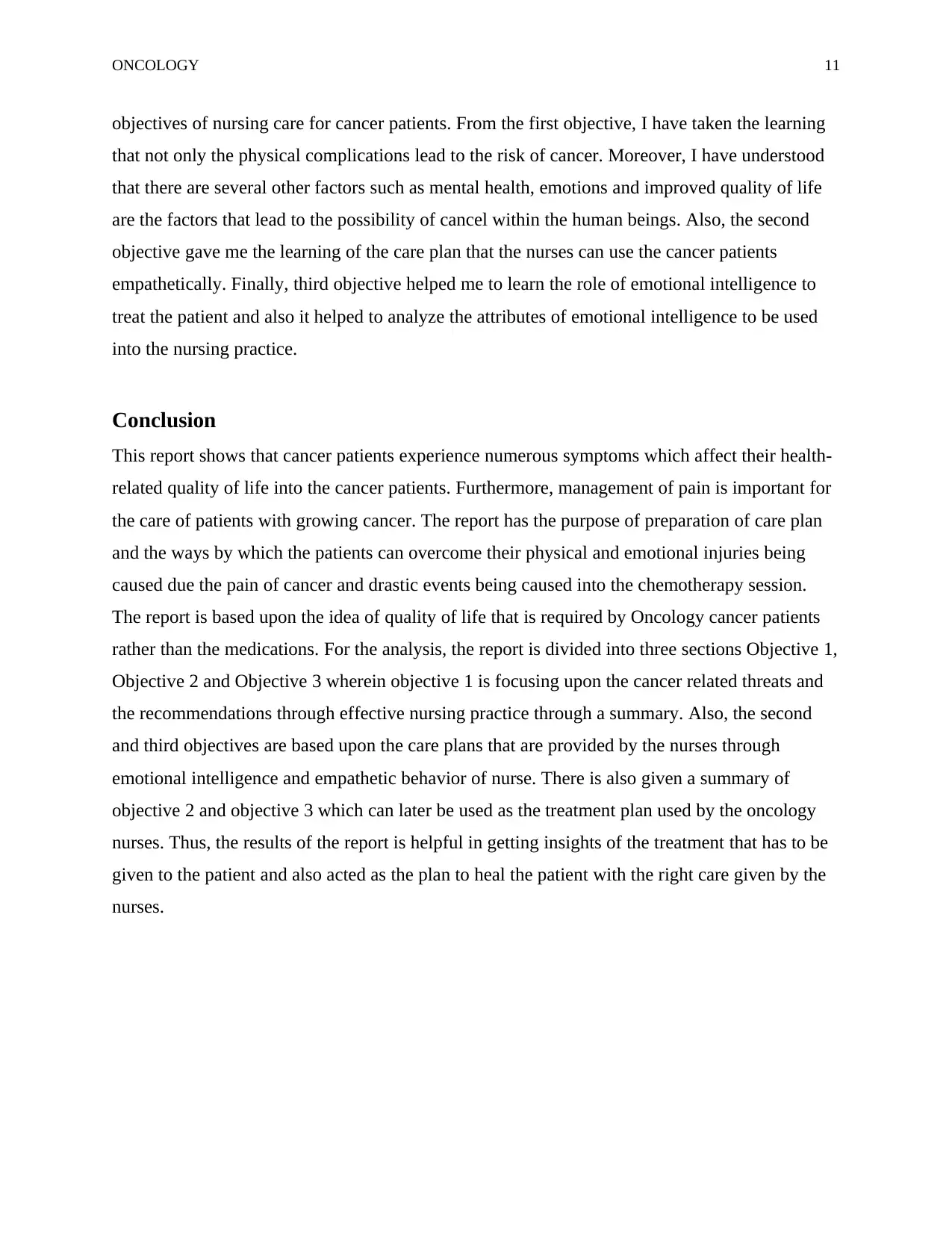
ONCOLOGY 11
objectives of nursing care for cancer patients. From the first objective, I have taken the learning
that not only the physical complications lead to the risk of cancer. Moreover, I have understood
that there are several other factors such as mental health, emotions and improved quality of life
are the factors that lead to the possibility of cancel within the human beings. Also, the second
objective gave me the learning of the care plan that the nurses can use the cancer patients
empathetically. Finally, third objective helped me to learn the role of emotional intelligence to
treat the patient and also it helped to analyze the attributes of emotional intelligence to be used
into the nursing practice.
Conclusion
This report shows that cancer patients experience numerous symptoms which affect their health-
related quality of life into the cancer patients. Furthermore, management of pain is important for
the care of patients with growing cancer. The report has the purpose of preparation of care plan
and the ways by which the patients can overcome their physical and emotional injuries being
caused due the pain of cancer and drastic events being caused into the chemotherapy session.
The report is based upon the idea of quality of life that is required by Oncology cancer patients
rather than the medications. For the analysis, the report is divided into three sections Objective 1,
Objective 2 and Objective 3 wherein objective 1 is focusing upon the cancer related threats and
the recommendations through effective nursing practice through a summary. Also, the second
and third objectives are based upon the care plans that are provided by the nurses through
emotional intelligence and empathetic behavior of nurse. There is also given a summary of
objective 2 and objective 3 which can later be used as the treatment plan used by the oncology
nurses. Thus, the results of the report is helpful in getting insights of the treatment that has to be
given to the patient and also acted as the plan to heal the patient with the right care given by the
nurses.
objectives of nursing care for cancer patients. From the first objective, I have taken the learning
that not only the physical complications lead to the risk of cancer. Moreover, I have understood
that there are several other factors such as mental health, emotions and improved quality of life
are the factors that lead to the possibility of cancel within the human beings. Also, the second
objective gave me the learning of the care plan that the nurses can use the cancer patients
empathetically. Finally, third objective helped me to learn the role of emotional intelligence to
treat the patient and also it helped to analyze the attributes of emotional intelligence to be used
into the nursing practice.
Conclusion
This report shows that cancer patients experience numerous symptoms which affect their health-
related quality of life into the cancer patients. Furthermore, management of pain is important for
the care of patients with growing cancer. The report has the purpose of preparation of care plan
and the ways by which the patients can overcome their physical and emotional injuries being
caused due the pain of cancer and drastic events being caused into the chemotherapy session.
The report is based upon the idea of quality of life that is required by Oncology cancer patients
rather than the medications. For the analysis, the report is divided into three sections Objective 1,
Objective 2 and Objective 3 wherein objective 1 is focusing upon the cancer related threats and
the recommendations through effective nursing practice through a summary. Also, the second
and third objectives are based upon the care plans that are provided by the nurses through
emotional intelligence and empathetic behavior of nurse. There is also given a summary of
objective 2 and objective 3 which can later be used as the treatment plan used by the oncology
nurses. Thus, the results of the report is helpful in getting insights of the treatment that has to be
given to the patient and also acted as the plan to heal the patient with the right care given by the
nurses.
⊘ This is a preview!⊘
Do you want full access?
Subscribe today to unlock all pages.

Trusted by 1+ million students worldwide
1 out of 16
Related Documents
Your All-in-One AI-Powered Toolkit for Academic Success.
+13062052269
info@desklib.com
Available 24*7 on WhatsApp / Email
![[object Object]](/_next/static/media/star-bottom.7253800d.svg)
Unlock your academic potential
Copyright © 2020–2025 A2Z Services. All Rights Reserved. Developed and managed by ZUCOL.




